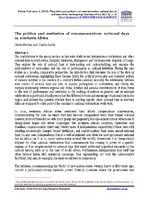The politics and aesthetics of commemoration: national days in southern Africa
Abstract
The contributions to the special section in this issue study recent independence celebrations and other national days in South
Africa, Namibia, Zimbabwe, Madagascar and the Democratic Republic of Congo. They explore the role of national days in
state-making and nation-building, and examine the performativity of nationalism and the role of performances in national
festivities. Placing the case studies in a broader, comparative perspective, the introduction first discusses the role of the state in
national celebrations, highlighting three themes: firstly, the political power-play and contested politics of memory involved in
the creation of a country’s festive calendar; secondly, the relationship between state control of national days and civic or
popular participation or contestation; and thirdly, the complex relationship between regional and ethnic loyalties and national
identifications. It then turns to the role of performance and aesthetics in the making of nations in general, and in national
celebrations in particular. Finally, we look at the different formats and meanings of national days in the region and address the
question whether there is anything specific about national days in southern Africa as compared to other parts of the continent
or national celebrations world-wide.

